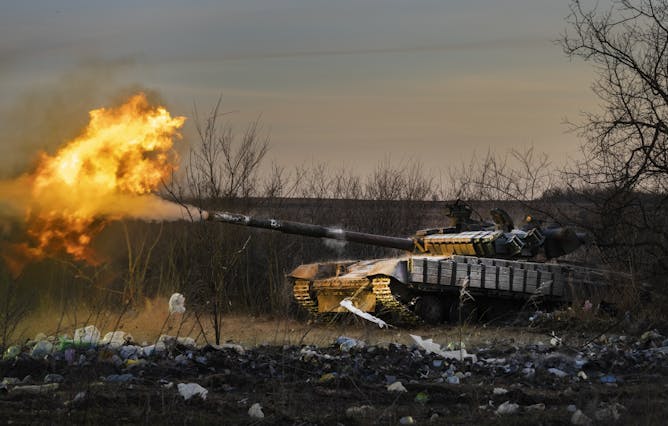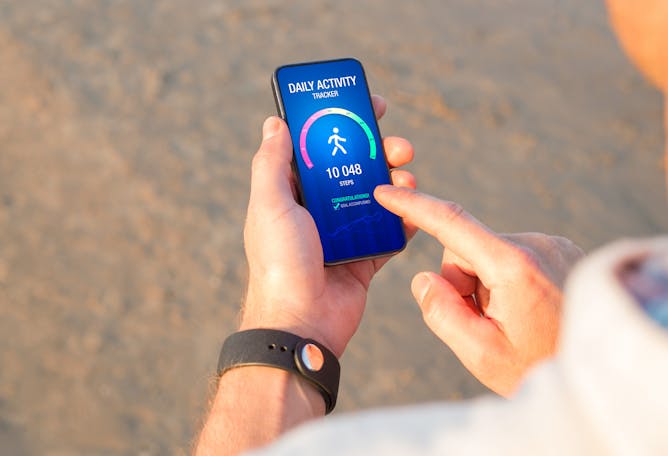|
|
|
|
It wasn’t a “sweep” — when major awards for Best Picture, Director, Actor, Actress and Screenplay all go to one film — but Christopher Nolan’s Oppenheimer still took the first three of these significant Oscars at the Academy Awards Sunday night, plus wins for Cinematography, Editing, Sound and Best Supporting Actor. Especially given so many awards, how should we think about how the film affects audiences?
Today in The Conversation Canada, Kim Nelson of University of Windsor shares insights from her book Making History Move: Five Principles of Historical Film to discuss critical criteria for viewing historical film — and what we are owed by historical filmmakers.
“Our ability to keep what we are watching at a critical distance is less robust than we may assume,” she writes. “Neuroscience illuminates a central aspect of film’s power to captivate, enchant and convince.”
She proposes thinking not only about how historical films treat evidence and how they narrate – but also factors like how they rupture their seamlessness (by allowing audiences to be pulled out of their immersion in the story). Her analysis yields helpful ways to think about not only this film, but other films treating major historical events, like The Zone of Interest and Killers of the Flower Moon.
Also today:
|

|
Susannah Schmidt
Education + Arts Editor
|
|

Christopher Nolan accepts the award for Best Director for ‘Oppenheimer’ during the Oscars on March 10, 2024, at the Dolby Theatre in Los Angeles, Calif.
(AP Photo/Chris Pizzello)
Kim Nelson, University of Windsor
The success of ‘Oppenheimer’ at the Academy Awards presents an opportunity to think about critical criteria for viewing historical film — and what we are owed by historical filmmakers.
|

A photograph of the 2017 total solar eclipse, taken at the Oregon State Fair Grounds, Salem, Ore.
(Dominic Hart/NASA)
Sarah Sadavoy, Queen's University, Ontario
Mentions of total solar eclipses in ancient history help researchers pinpoint precise dates of notable events.
|

A Ukrainian tank fires at Russian positions in Chasiv Yar, the site of fierce battles in the Donetsk region, Ukraine, Feb. 29, 2024.
(AP Photo/Efrem Lukatsky)
Alexander Hill, University of Calgary
Russia’s armed forces continue to gain territory in Ukraine, at high cost to both sides.
|

Digital solutions like fitness apps have the same stumbling blocks as other exercise programs: it’s hard to form healthy habits.
(Shutterstock)
Marc Mitchell, Western University
Offering financial incentives for exercise may be one way of stimulating, and sustaining, a more active lifestyle. Research suggests that even after rewards stop, exercise gains mostly persist.
|

When buying pre-packaged foods, consumers with allergies rely on the declarations in the list of ingredients to identify safe foods.
(Shutterstock)
Silvia Dominguez, Université Laval; Jérémie Théolier, Université Laval; Samuel Godefroy, Université Laval
Vegan foods are considered by most consumers to have no ingredients of animal origin, but they may actually contain milk proteins.
|
La Conversation Canada
|

Dans le métro de Pékin, des usagers consultent leur téléphone intelligent, où on s’informe, se divertit, échange des messages, personnels et professionnels. Le gouvernement chinois a accès à toutes les données collectées. Comment les citoyens vivent-ils cette surveillance numérique constante?
(Shutterstock)
Ariane Ollier-Malaterre, Université du Québec à Montréal (UQAM)
La surveillance des citoyens par les États se développe dans le monde entier, mais c’est une réalité de la vie quotidienne en Chine. La population développe des tactiques mentales pour s’en distancier.
|
Business + Economy
|
-
Jose Caballero, International Institute for Management Development (IMD)
More than 6 million people have fled Venezuela seeking better living conditions – now they are boosting economic growth in their host countries.
|
|
Culture + Society
|
-
Mahan Mirza, University of Notre Dame
Ramadan encourages acts of charity. This also poses a question for many Muslims as they consider what more could be done to feed the hungriest in the world, many of whom are in Gaza.
|
|
Environment + Energy
|
-
Cassandra Rowe, James Cook University; Corey J. A. Bradshaw, Flinders University; Michael Bird, James Cook University
Indigenous fire management shaped Australian tropical savannas over millennia, until the arrival of Europeans pushed the landscape back into a dangerous, unmanaged state.
|
|
|
|
| |
| |
| |

|
| |
| |
| |
| |
| |
| |
|
|
|
|
|
|
|